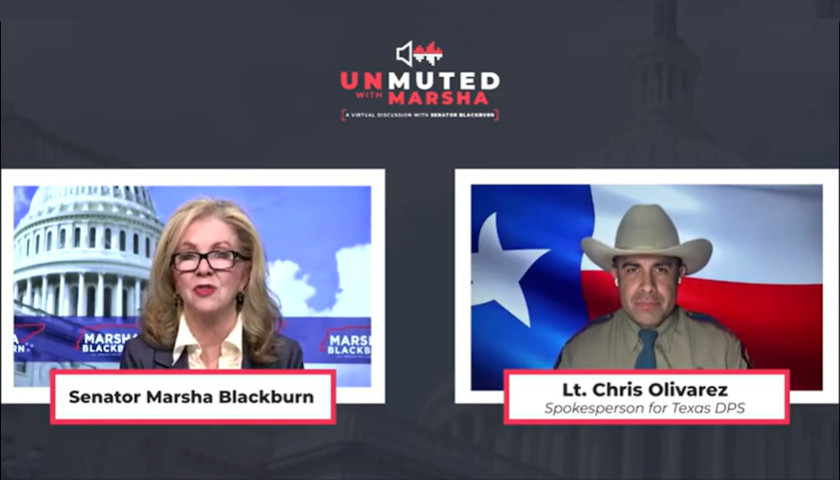State Representative Bruce Griffey sponsored a bill that he says will solve Tennessee’s revenue shortfall caused by the shutdown associated with the COVID-19 pandemic.
In a May 19 letter to the editor (embedded below), Griffey offers, “How To Solve Tennessee’s COVID 19 (a.k.a. Chinese virus) Budget Problem.”
Calling the solution “simple,” Griffey calls for passing his HB1706, which was sponsored by Senator Mark Pody under SB2075, which would impose sales tax on money transfers from Tennessee to foreign countries.
As Griffey points out, the state’s revenues were $693.8 million less than the $1.3 billion budgeted for the month of April, which was a negative growth rate of 40 percent compared to April 2019, The Tennessee Star reported.
The legislator’s proposal would have the 7 percent state sales tax rate and up to the maximum 2.5 percent sales tax that the locals have adopted applied to money transfers going to foreign countries.
The sales tax would apply to persons making such transfers only if the person is without a social security number or taxpayer-identification number. In other words, illegal aliens.
The fiscal note associated with the bill estimated that the collection of the taxes would generate $371 in new revenue in the first half-year of implementation and $742 million in each year that follows.
Griffey points out that most Tennesseans are probably not aware that in 2018, there was $14.5 billion in money transfers to foreign countries from Tennessee alone.
Meanwhile, in 2017 illegal immigration cost Tennessee taxpayers $793 million for the additional burdens on our education system, law enforcement agencies and healthcare system, among other things, says Griffey.
The application of the sales tax on out-of-country wire transfers is limited to only those who are not in the state or federal taxpayer system, because they are not contributing like other Tennesseans, according to the representative.
In a sales tax reliant state like Tennessee, when cash is transferred outside the state, it will never be spent in the state and, in turn, cannot support the state’s economy.
Griffey made a related proposal last year that would have collected a transaction fee from each customer of $10 plus one percent of the transfer amount over $500. A portion of the fees would have been used for specific law enforcement related activities and half would have been designated for the purpose of securing the southern border.
Both bills met their demise in the House Banking & Investments Subcommittee of the House Commerce Committee. While the make-up of the committee differs from last year to this, the bills died from No votes or “Present and not voting” by Republicans.
Yet the super-majority Republican legislature, before recessing due to the coronavirus pandemic, passed a tax increase on all Tennesseans that amounts to $112 million in the first partial year and $151 million in future full years, The Star reported.
The bill, SB2182 / HB2249, requires that all marketplace facilitators with sales in Tennessee over $500,000 such as Amazon and Ebay collect sales tax. The measure passed by an overwhelming majority in both the House with an 86 Ayes, 1 No and 4 Present and not voting and 30 Ayes, 0 Noes and 1 Present and not voting in the Senate.
Griffey questions whether his fellow Republican legislators were convinced that his HB1706 was a bad bill by lobbyists for the licensed money transfer agents.
He explains that the bill could be brought back up for consideration by suspending the rules or by one of the legislators who voted against or didn’t vote asking to change their vote and reconsidering the actions.
The legislature plans to reconvene on June 1 with floor sessions, while House subcommittee meetings are set to resume on May 26.
– – –
Laura Baigert is a senior reporter at The Tennessee Star.









Excellent idea! This should have been done long ago to IAs and other foreign nationals funneling money out of U.S. It is difficult to start something like that in a defacto sanctuary city like Nashville.
Tax the money at a mere 2.5%?How about 32%! Mayor Cooper seems to think 32% is a well rounded number.
PLEASE Do it!
Excellent idea Mr. Griffey. Please make haste and get this done!
Let’s tax frivolous General Assembly resolutions! That will go a long way in making up the shortfall.
This bill is UNCONSTITUTIONAL!!! It targets immigrants and refugees specifically. Shame on you!! People have families to feed and bills to pay in their home countries.
Hey BS, this legislation targets foreign citizens that are here illegally! Since when are they covered by our Constitution? And wire transferring of money is a “service” which, if you are so bent on being fair, should have a “sales” tax associated with it, just like when you get your car fixed, your HVAC serviced, your hair cut, etc. Of course personally, I think we should wait for them at the wire transfer businesses, confiscate the money (using civil asset forfeiture laws), and instantly ship them back to where they came from, period! The confiscated money would defray the cost of the one way plane ticket.
Plus, if they have families to feed in other countries, go there and work.
John J – I really like the way you think!
Representative Griffey’s idea is brilliant! Aren’t most other “services” in Tennessee subject to sales tax? So, why would any elected representative in Tennessean vote against this proposal?
The “deep state” exists on both sides of the aisle.
Great idea, at least we can recover money that should not be made by people that should not be here to start with.